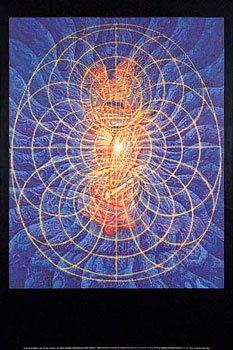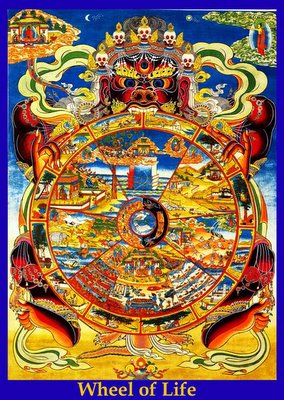A while back, Joe Perez posted on the idea of polyamory as a post-conventional form of relationship. I suspect there are many who would disagree and see the desire to be in more than one intimate relationship at a time as immoral. I certainly do not think it is immoral, but I am undecided regarding its place as part of an integral model of relationship.
Joe's post also contained a developmental model of relationship based on Lawrence Kohlberg's stages of moral development. This is how Joe described his model:
In the first (pre-conventional) stage, dynamics are characterized by a desire for fluid and polymorphously perverse sexual play with multiple partners, and/or sexual role playing based on power dynamics (fetish, sadomasochistic play, etc.) Non-monogamy is valued; monogamy is derided as something for fuddy duddies and uptight squares.
In the second (conventional) stage, sexual relationships are characterized by a desire for a balanced relationship with one primary partner, usually in a conventional marriage/domestic partnership. Monogamy is held to be virtuous, and non-monogamous liaisons are forbidden as adulterous or cheating.
In the third (post-conventional) stage, sexual relationships are characterized by a desire for deep intimacy and passionate sexual aliveness that may be found with one or more partners in either conventional or unconventional relationships. Monogamy and non-monogamy are both recognized as playing important roles in the development of a mature sexuality.
I would argue (from my perspective) that the pre-conventional stage is not as fun-loving as is presented. At this stage, power and control are more important than anything else. Most of the time, it will be male domination and conquest--one partner will possess the other. At this stage there is no emotional content or concern for the other's well-being. It is a physical act. We see this in the primate world where sex is a form of currency, or in tribal cultures where "wives" are accumulated to ensure the birth of sons. Sexuality at this stage may also be attended by various taboos based on pleasing the Gods, protecting the hunt or the fertility of crops, or preventing birth defects (incest taboo). In modern cultures, this stage may take on some of the traits Joe mentions, but only among those who are consciously participating at a stage below their overall center of gravity.
The conventional stage contains what we think of as traditional relationship forms, especially marriage. Joe nailed this one, aside from perhaps the "balanced" part, which is more appropriate to post-conventional egalitarianism.
I agree for the most part with Joe's post-conventional stage. As I mentioned above, I haven't decided where I come down on the polyamory element that Joe argues is part of the post-conventional stage. My experience tells me that multiple intimate partners is not often tolerated and, even more, seldom works for all involved.
I would like to take the idea of developmental stages for relationship a little deeper using Spiral Dynamics as a model to look at how different worldviews might influence relationship patterns and eventually lead to an integral model of relationship. What I am proposing is a unique "relationship" developmental line that progresses up the Spiral. Of course, a relationship line will be influenced by the moral development line, by emotional development, by intellectual development, and so on, up to and including the spiritual development line.
This exploration is meant to be a first step toward an integral model of relationship. I do not pretend to know how an integral relationship might look, though I have some ideas. I am hoping that this might generate some discussion so that we might work together to create an imprint, an archetype for integral relationship. To my knowledge, this is a new frontier waiting to be explored.
At the animistic/tribal (Purple) stage, most behavior is organized around maintaining safety in an unsafe world. Magic and superstition are primary modes of manipulating the world. Family bonds are important, but families will often have more than one wife per husband. Ancestors are respected and customs, including relationships, are based on how things have always been done. Relationship at this stage is mostly about procreation and commerce (sex for food and safety). There may be recreational sexuality, but there is not likely to be much "sharing" in the sense that we think of it.
As people move into egocentric/exploitive (Red) stage, personal gratification becomes even more central, as do control and domination. Power is the currency of this stage where strength is the key to survival. The world is seen as hostile and dangerous, and each person is on his/her own. Needs gratification is central for men, while women are still looking for safety and status within the group (determined by the man she is with). Rigid rules are not as important here, and individuals might be more open to experimenting with whatever feels good, including same-sex partners, group sexuality, and other previously taboo expressions of relationship.
When the absolutist/traditionalist (Blue) stage emerges, divine authority becomes the central focus of rules and conduct. There is only one right way to do things, including relationships, and all other expressions of relationship are sinful. At this stage, monogamy becomes the preferred form of coupling. Stability and order are seen as necessary for a successful community life, and monogamy fits that model. There is often some form of divinely revealed reason for this model (Adam and Eve for Jews, Christians, and Muslims). At this point in human development, relationship is often seen as solely for the purpose of procreation, but now there is the added element of duty (the father to his wife and children, or a wife to her kids and husband). Sexual taboos are present again, often as a way to limit enjoyment of sexuality so that people will focus more of their attention on serving God (or country, community, church, and so on). For the first time in any large numbers, genuine love can become an element of the relationship.
Eventually, the individual ego will reassert itself and its needs in the materialist/achiever (Orange) stage of development. Rather than subordinate needs and desires to divine authority, individuals begin to seek out what feels good to them. But it's different than it was at the egocentric stage because the individual is entering a post-conventional moral stage where right and wrong are felt from the inside rather than imposed from the outside. Relationships at this stage are built around self-expression and forming alliances. Romantic love is usually the initial magnetism, but a lasting bond will be a partnership of equals who both get their needs met through the relationship. Because self-expression is important, individuals at this stage will experiment more with previously taboo partnerships and modes of relating. Same-sex, role playing, and bondage/fetish expressions are now on the table. Emotion is still not a central element, though feeling "good," desired, sexy, and so on is important to both (or all) partners. This is the stage where I see polyamory being a viable option.
At some point, emotions, equality, and egalitarianism will become central concerns. This stage is known as the relativistic/social (Green) stage, often referred to as postmodernism. Relational expressions become a central concern at this stage. Individuals are more aware of their own emotional life and feel the need to have emotional needs met in their relationships. Reproduction, sexual satisfaction, and status are no longer sufficient. A person at this stage wants to be able to express his/her feelings and feel an emotional connection with her/his partner. Post-conventional relationship patterns are even more likely at this stage. The primary focus, no matter what form the relationship takes, is on experiencing and sharing emotions, building relationships, expressions of spirituality, and creating equality and liberation for all involved.
Having reached this point, and it's fair to say that few really have reached this stage in American culture, a major transition is possible. Integral relationship is on the horizon.
In the next installment I will attempt to outline a preliminary sketch of what an integral relationship might look like and how it might work.
Go to Part Two.





